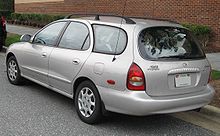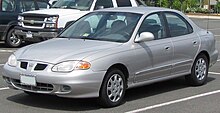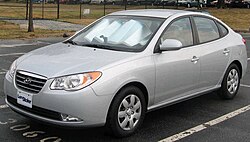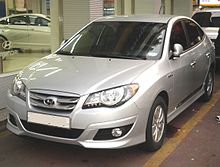Hyundai Elantra: Difference between revisions
m updated the default picture to the current model (2011) picture |
|||
| Line 1: | Line 1: | ||
{{Infobox automobile |
{{Infobox automobile |
||
|name=Hyundai Elantra |
|name=Hyundai Elantra |
||
|image=[[File: |
|image=[[File:20100804 hyundai avante 1.jpg|250px|Hyundai Avante MD, Korea]] |
||
|name=Hyundai Elantra |
|name=Hyundai Elantra |
||
|manufacturer=[[Hyundai Motor Company]] |
|manufacturer=[[Hyundai Motor Company]] |
||
Revision as of 15:39, 24 October 2010
| Hyundai Elantra | |
|---|---|
 | |
| Overview | |
| Manufacturer | Hyundai Motor Company |
| Production | 1990–present |
| Body and chassis | |
| Class | Compact(1990-2000) Midsize (2001-present) |
| Layout | FF layout |
| Chronology | |
| Predecessor | Hyundai Pony |
| Successor | Hyundai i30 (hatchback, Europe, Israel & Iran only) |
The Hyundai Elantra (Korean: 현대 엘란트라), or Hyundai Avante (현대 아반떼) in South Korea, is a compact car from Hyundai of South Korea launched for the 1991 model year, and now in its fourth generation.
The Elantra was formerly marketed as the Lantra and the Avante in Australia and some European markets. In Australia, this was due to the similarly named Mitsubishi Magna Elante model.[1] This gave rise to disagreement from other motor manufacturers, and the name was standardized as "Elantra" worldwide in 2001 (with the exception being Korea and Malaysia still selling under the name Avante).
First generation (1990–1995)
| First generation | |
|---|---|
 | |
| Overview | |
| Also called | Hyundai Lantra |
| Production | 1990-1995 |
| Model years | 1991–1995 |
| Assembly | Ulsan, Korea |
| Body and chassis | |
| Body style | 4-door sedan |
| Powertrain | |
| Engine | 1.5/1.6/1.8L 86/113/124 hp I4 |
| Transmission | 5-speed manual 4-speed automatic |
| Dimensions | |
| Wheelbase | 2,500 mm (98.4 in) |
| Length | 1990-1993:4,375 mm (172.2 in) 1993-1995:4,405 mm (173.4 in) |
| Width | 1990-1993:1,675 mm (65.9 in) 1993-1995:1,680 mm (66.1 in) |
| Height | 1990-1993:1,395 mm (54.9 in) 1993-1995:1,390 mm (54.7 in) |
| Curb weight | 2522 lb (1144 kg) |
Launched in 1990 to compete with the Honda Civic and Toyota Corolla,[citation needed] the Elantra (codename J1) received a mid-term facelift in 1993. It was front-wheel-drive and replaced the aging rear-drive Hyundai Pony.
The Elantra was powered by a Mitsubishi-designed 1.6 L (1596 cc) straight-4 This DOHC 16-valve 1.6 L unit produced 113 hp (84 kW) at 6000 rpm and could push the Elantra to 60 mph (97 km/h) in 9.5 seconds. The quarter-mile (0.4 km) run took 17.1 seconds and produced 80 mph (129 km/h). Top speed was 116 mph (187 km/h). The Elantra got 22 mpg[clarification needed](10.7 L/100 km) in the city cycle. Starting in 1993 there was also a Mitsubishi-designed 1.8 L (1836 cc) straight-4 engine available the 1.8L unit that produced 124 hp (99 kW) at 6000 rpm.
Facelifts


The Hyundai Elantra was facelifted in 1992 for the European market, adding Hyundai's current logo to the grille, although North American models retained the previous year's look. In 1993, the vehicle was facelifted again. The third (second in North America) and final facelift of this generation occurred in 1994 for both front and rear fascias.
Second generation (1995–2000)
| Second generation | |
|---|---|
 | |
| Overview | |
| Also called | Hyundai Avante (South Korea) Hyundai Avante Touring (Wagon in South Korea) Hyundai Lantra Bimantara Cakra Bimantara Nenggala |
| Production | 1995–2000 |
| Model years | 1996–2000 |
| Assembly | Ulsan, Korea |
| Body and chassis | |
| Body style | 5-door station wagon 4-door sedan |
| Powertrain | |
| Engine | 1.5/1.6/1.8/2.0L 89/112/130/140 hp I4 (104 kW) |
| Transmission | 5-speed manual 4-speed automatic |
| Dimensions | |
| Wheelbase | 2,550 mm (100.4 in) |
| Length | 1995-1998 Sedan:4,420 mm (174.0 in) 1995-1998 Wagon:4,450 mm (175.2 in) 1998-2000 Sedan:4,450 mm (175.2 in) 1998-2000 Wagon:4,515 mm (177.8 in) |
| Width | 1995-1998:1,700 mm (66.9 in) 1998-2000:1,735 mm (68.3 in) |
| Height | 1,395 mm (54.9 in) 1998-2000 Wagon:1,460 mm (57.5 in) |

Launched in 1995, the second generation (codename J2) was offered as a sedan and station wagon. It was sold in the Korean market as the Avante in sedan form and Avante Touring in station wagon bodystyle.
Between 1996 and 1998, the Elantra was marketed as the Bimantara Nenggala (1.8 litre petrol) in Indonesia. (The Cakra (1.5 litre petrol) was based on the Accent [X3].)
At launch, a 1.5-litre Alpha SOHC (107 hp) I4 engine and 1.8-litre Beta DOHC (128 hp) gasoline I4 engine were available on the domestic market. Later, a 1.5-litre lean-burn (98 hp) gasoline engine based on Alpha DOHC engine was added. A mid-life facelift arrived for 1999. The Philippine version, as well as in some European markets, had the 1.6 (1599 cc) Beta, DOHC (G4GR) which produced 116 hp (87 kW) (in some European markets 66 kW (90 PS; 89 hp)).
In Europe, 1996-1997 sedan models had carried a silver Mercury-type grille, whereas station wagon models had carried the same grille as the North American sedan and wagon models.
In Australia, the station wagon was called the Lantra Sportswagon and was a popular model of Hyundai.
A 2 litre engine option became available near the end of its production run. In Australia the GLS model was an upgrade on the GL model, and supplies 2 litre engine, velour trim, softer cloth seats, and Hyundai's version of mag wheels. Also the GLS had matching paint on rear number plate light holder and side mirrors.
Facelift


The Hyundai Elantra/Lantra received newer grilles for the 1998 model year, and for the first time in Europe, the Lantra sedan now shares the same grille as the wagon.
Third generation (2000–present, USA: 2000–2006)
| Third generation (XD) | |
|---|---|
 | |
| Overview | |
| Also called | Hyundai Avante XD (South Korea) Beijing-Hyundai Elantra Beijing-Hyundai Elantra Sports |
| Production | 2000-present |
| Model years | 2001–2006 |
| Assembly | Ulsan, Korea Beijing, China Caracas, Venezuela (MMC Automoritz)[2] Taganrog, Russia (TagAZ)[3] |
| Body and chassis | |
| Body style | 5-door hatchback 4-door sedan |
| Related | Hyundai Tucson Hyundai Matrix Hyundai Tiburon Kia Spectra Kia Sportage |
| Powertrain | |
| Engine | Pre-facelift models (2000–2003): 1.6L I4 16 valve 107 hp 1.8L I4 16 valve 128 hp 2.0L I4 16 valve 141 hp 2.0L I4 16 valve turbodiesel 113 hp Facelift models (2003–2006): 1.6L I4 16 valve 105 hp 1.8L I4 16 valve 132 hp 2.0L I4 16 valve 143 hp 2.0L I4 16 valve turbodiesel 113 hp |
| Transmission | 5-speed manual 4-speed automatic |
| Dimensions | |
| Wheelbase | 2,610 mm (102.8 in) |
| Length | 2000-2003 Sedan:4,510 mm (177.6 in) 2000-2003 Hatchback:4,495 mm (177.0 in) 2003-2006 Sedan:4,525 mm (178.1 in) 2003-2006 Hatchback:4,520 mm (178.0 in) |
| Width | 2000-2003 Sedan:1,720 mm (67.7 in) 2003-2006 Sedan:1,725 mm (67.9 in) Hatchback:1,720 mm (67.7 in) |
| Height | 1,425 mm (56.1 in) |
| Curb weight | 2635 lb (1195.2 kg) |




An all-new model (codename XD) was launched in 2000. The wagon was dropped in favor of a five-door hatchback. Starting in 2001, all American models came with standard front and front side airbags, air conditioning, power locks, power windows and power steering. This simplified dealer inventories and repairs and also sought to improve Hyundai's image of 'value' cars. In 2003, the Elantra received a facelift for all models (codename XD2). The facelift gave the Elantra new headlights and taillights, a new grille, new front and rear bumpers, a refreshed hood and trunk, and a refreshed dashboard.
The GLS trim is the standard trim for the Elantra. The top of the line model, the GT trim, came with a stiffer suspension, leather seats, fog lights, alloy wheels, lip spoiler and blue-lit instrument cluster. It was offered as a hatchback since 2001 as a 2002 model year vehicle. The only options for the GT trim were an automatic transmission, power moonroof and anti-lock brakes with traction control. The only major option was a Kenwood MP3/CD deck. The GT trim sedan was introduced in 2003 and discontinued in 2005. The GT trim was replaced with the Limited trim for the 2006 model year. The limited trim featured new paint colors, a chrome vertical grille, leather interior with leather steering wheel and leather shifter, and wood trim. The Limited trim did not feature alloy wheels, only steel rims with a 6-spoke cover featured in the GLS model. The GT trim for the five door was produced for the remainder of the 2006 model year.
The Elantra is available with 1.6, 1.8 and 2.0 L gasoline engines and a 2.0 L turbodiesel. North American models are only available with the 2.0L gasoline engine. The 1.8 engine is a 1.6 engine modified for the New Zealand market.
While compact on the outside, it is listed by the United States Environmental Protection Agency as a mid-size car because of a spacious interior. Although the basic powertrain design has changed little since the second generation, successive improvements have improved fuel economy from an EPA rating of 24 mpg‑US (9.8 L/100 km; 29 mpg‑imp)/33 mpg‑US (7.1 L/100 km; 40 mpg‑imp) to 25 mpg‑US (9.4 L/100 km; 30 mpg‑imp)/33 mpg‑US (7.1 L/100 km; 40 mpg‑imp) and the current 27 mpg‑US (8.7 L/100 km; 32 mpg‑imp)/34 mpg‑US (6.9 L/100 km; 41 mpg‑imp) for manual transmissions, with automatic producing 23 mpg‑US (10 L/100 km; 28 mpg‑imp)-3 mpg‑US (78 L/100 km; 3.6 mpg‑imp) fewer. Horsepower also improved from 135 hp (100 kW) to 138 hp (102 kW) and torque from 132 to 136 mainly thanks to the addition of continuously variable valve timing (CVVT) in 2004. Originally, the horsepower rating was misrepresented as 140 hp (104 kW). In 2006 the Elantra was offered with a SULEV emission rated engine in some U.S. states.

- Hyundai Elantra (2000–2003) performance:
| Model | Engine | Displ. | Power | Torque | 0–100 km/h | Top speed |
|---|---|---|---|---|---|---|
| 1.6L DOHC | I4 16V | 1600 cc | 79 kW (107 PS; 106 hp) @ 5800 rpm | 143 N⋅m (105 lb⋅ft) @ 3000 rpm | 11.0 sec. | 182 km/h (113 mph) |
| 1.8L DOHC | I4 16V | 1796 cc | 94 kW (128 PS; 126 hp) @ 6000 rpm | 166 N⋅m (122 lb⋅ft) @ 5000 rpm | 9.7 sec. | 199 km/h (124 mph) |
| 2.0L DOHC | I4 16V | 1975 cc | 104 kW (141 PS; 139 hp) @ 6000 rpm | 186 N⋅m (137 lb⋅ft) @ 4500 rpm | 9.1 sec. | 206 km/h (128 mph) |
| 2.0L CRDi | I4 16V | 1991 cc | 83 kW (113 PS; 111 hp) @ 4000 rpm | 255 N⋅m (188 lb⋅ft) @ 2000 rpm | 11.7 sec. | 190 km/h (118 mph) |
- Hyundai Elantra (2003–2006) performance:
| Model | Engine | Displ. | Power | Torque | 0–100 km/h | Top speed |
|---|---|---|---|---|---|---|
| 1.6L DOHC | I4 16V | 1599 cc | 77 kW (105 PS; 103 hp) @ 6000 rpm | 143 N⋅m (105 lb⋅ft) @ 4500 rpm | 11.0 sec. | 182 km/h (113 mph) |
| 1.8L DOHC | I4 16V | 1795 cc | 97 kW (132 PS; 130 hp) @ 6000 rpm | 162 N⋅m (119 lb⋅ft) @ 4500 rpm | 10.2 sec. | 195 km/h (121 mph) |
| 2.0L DOHC | I4 16V | 1975 cc | 105 kW (143 PS; 141 hp) @ 6000 rpm | 186 N⋅m (137 lb⋅ft) @ 4500 rpm | 10.4 sec. (8.4 sec. manual) | 208 km/h (129 mph) |
| 2.0L CRDi | I4 16V | 1991 cc | 83 kW (113 PS; 111 hp) @ 4000 rpm | 235 N⋅m (173 lb⋅ft) @ 2000 rpm | 11.6 sec. | 190 km/h (118 mph) |
Fourth generation (2006–present)
| Fourth generation (HD) | |
|---|---|
 | |
| Overview | |
| Also called | Hyundai Avante Beijing-Hyundai Elantra Yue Dong |
| Production | 2006–present |
| Model years | 2007–2010 (2011 for Elantra Touring) |
| Assembly | Beijing, China Ulsan, Korea |
| Body and chassis | |
| Body style | 4-door sedan 5-door station wagon |
| Related | Hyundai i30 Hyundai Tucson/ix35 Hyundai Elantra LPI Hybrid Kia cee'd Kia Forte Kia Forte Koup Kia Sportage |
| Powertrain | |
| Engine | 1.6L Gamma I4 petrol 2.0L Beta II I4 petrol 1.6L CRDI I4 U-Line diesel |
| Transmission | 5-speed manual 4-speed automatic |
| Dimensions | |
| Wheelbase | 2,650 mm (104.3 in) Elantra Touring:2,700 mm (106.3 in) |
| Length | 4,505 mm (177.4 in) Elantra Touring:4,475 mm (176.2 in) Elantra Yue Dong:4,542 mm (178.8 in) |
| Width | 1,775 mm (69.9 in) |
| Height | 1,480 mm (58.3 in) Elantra Touring:1,565 mm (61.6 in) Elantra Yue Dong:1,490 mm (58.7 in) |

A redesigned Elantra sedan (codename HD) debuted at the 2006 New York Auto Show for model year 2007. The engine lineup includes 1.6 L Gamma and 2.0 L I4 Beta II gasoline engines, and a 1.6 L turbo diesel I4 engine. Only the 2.0 L engine is offered in North America. All engines feature improved fuel economy over previous versions. A five-speed manual transmission is standard and a four-speed automatic is optional. In North America, the base GLS trim, unlike the previous year's, does not include air conditioning as standard equipment, but adds side curtain airbags (previously front and side only), active head restraints and all-disc brakes with 4-channel ABS. The Elantra also offers the most interior room in its class, leading the US EPA to classify it as a mid-size car.
Model year changes
- 2008
For 2008, the Limited trim level was dropped, leaving GLS and SE trim choices in the U.S. The SE trim includes features not available on the GLS, such as telescopic steering wheel and electronic stability control, with sunroof and leather as options. According to Consumer Reports testing, the SE trim has significantly better handling and braking, moving it to the top of their small car ratings, while the GLS trim was closer to the middle of the pack.
- 2009
For 2009, iPod and USB interface system became standard equipment on the SE models. On the central instrumentation, the gear shift indicator has been moved to the trip computer display, and the coolant temperature gauge has been removed. GLS models receive new wheel cover designs, and SE models have a rear garnish on the rear license plate border. Exterior color choices now include Natural Khaki.
- 2010
For 2010, a new Blue trim is added, a basic model modified for increased fuel economy. The grille receives a slightly modified design, and Blue and GLS models also receive chrome rear garnish. The interior receives chrome door handles, new metallic interior finish, cup holders, and a chrome-trimmed gear selector for SE models. GLS and SE models now have a standard automatic transmission, while the lesser Blue models only comes with a manual. The GLS is available with sunroof or LG navigation system; SE is available with a choice of two packages, sunroof with heated seats, or sunroof, heated seats, LG Navigation and Bluetooth. iPod and USB connectivity became standard on the GLS and available on the Blue. Exterior color choices have been slightly changed, with Nordic White and Black Noir Pearl replacing the Captiva White and Black Pearl, respectively, and Purple Rain was removed.
Canadian Models
Canadian trim levels are different from the U.S. models and are as follows.
The base model L offers a base package with a four speaker CD/MP3/Aux stereo and front airbags. This trim also includes power windows in the front with manual windows in the rear. Moving up to the GL will get you heated mirrors, AC, power windows all around, heated seats, a six speaker CD/MP3/Aux stereo, wheel mounted cruise control and keyless entry with alarm. The GLS trim adds wheel mounted audio controls, ABS, disc brakes, and front seat-mounted side-impact and roof-mounted side curtain airbags. The sporty GLS with Sport Package adds a rear spoiler, power tilt/sliding moonroof, 16” alloy wheels, fog lights, trip computer and a leather wrapped steering wheel and leather shifter. The final trim level, the Limited, adds leather seats, a telescopic steering wheel and automatic climate control.
Safety
According to the Insurance Institute for Highway Safety the Elantra received a Good overall score in the frontal crash test and an Marginal overall score in the side impact test, but all Hyundai Elantras manufactured after November 2009 earned a Good overall score in the side impact test.[4][5][6] Standard side airbags include front and rear head curtain airbags and front seat-mounted torso airbags.
Awards
The 2009 Elantra was the highest quality compact car by J.D. Power's quality study.[7] The study measures 228 attributes, including the overall driving experience, engine and transmission, and a broad range of defect and design problems reported by vehicle owners.[8][9]
The 2008, 2009, and 2010 Elantra SE has been consistently chosen as a Top Pick for Small Sedans under Consumer Reports magazine.
Hyundai Elantra Yue Dong (Elantra HDC)
Beijing Hyundai launched a redesigned Elantra called the Yue Dong for the Chinese market with an updated exterior.
Elantra LPI Hybrid
It has been suggested that Hyundai Elantra LPI Hybrid be merged into this article. (Discuss) Proposed since August 2010. |

Hyundai began producing the Elantra LPI Hybrid (called Avante in the local market) and it was launched in the South Korean domestic market in July 2009. The Elantra LPI (Liquefied Petroleum Injected) is the world's first hybrid electric vehicle to be powered by an internal combustion engine built to run on liquefied petroleum gas (LPG) as a fuel. The Hyundai Elantra LPI is a mild hybrid and the first hybrid to adopt advanced lithium polymer (Li–Poly) batteries.[10][11]\
Elantra Touring

Hyundai offers a Hyundai i30 wagon in the U.S. and Canada marketed as the Elantra Touring. Elsewhere, the same vehicle is marketed as the Hyundai i30 cw.
Fifth generation (2011–)
| Fifth generation (MD) | |
|---|---|
 | |
| Overview | |
| Also called | Hyundai Avante |
| Production | 2010-present |
| Model years | 2011–present |
| Assembly | Alabama, USA[12] Ulsan, Korea |
| Body and chassis | |
| Body style | 4-door sedan |
| Related | Hyundai Tucson/ix35 Kia Sportage Kia cee'd Hyundai i30 |
| Powertrain | |
| Engine | 1.6L Gamma GDI I4 petrol |
| Transmission | 6-speed automatic 6-speed manual |
| Dimensions | |
| Wheelbase | 2,700 mm (106.3 in) |
| Length | 4,530 mm (178.3 in) |
| Width | 1,775 mm (69.9 in) |
| Height | 1,435 mm (56.5 in) |
The fifth generation Avante, codenamed "MD",[13] debuted at the 2010 Busan International Motor Show in April 2010. It features a 1.6L gasoline direct-injection engine, producing 103 kW (138 hp) and 167Nm (123 lb-ft) torque, mated to a new 6-speed automatic or a 6-speed manual transmission. The design continues Hyundai's "fluidic sculpture" styling theme first seen in the 2011 Sonata. The new model went on sale in August 2010 in South Korea and is expected to begin selling in the U.S. in early 2011 (as a 2011 model).[14]
Naming disputes
Mitsubishi Motors of Australia complained that Elantra was too close to its Elante trim level, and Lotus (as well as Kia) in the UK and Europe suggested it was too close to its Elan name, and its Kia counterpart. By 2001, both the Elan and the Elante had ceased production but the Avante's renaming remained necessary as Audi owned the Avant name in Europe.
The Elantra in popular culture
- An unbadged 3rd generation Hyundai Elantra GT appears in the video game Drift City under the name "Advance".[15]
See also
- Hyundai Santa Fe Blue Hybrid
References
- ^ "Nw Car Report- Hyundai Elantra (2001-) - RACV". Retrieved 2010-01-17.
- ^ "Hyundai-motors.com.ve - Elantra: Exterior". Hyundai-motor.com.ve. Retrieved 2010-08-10.
- ^ "ТагАЗ: Elantra XD". Tagaz.ru. Retrieved 2010-08-10.
- ^ "IIHS-HLDI: Hyundai Elantra". Iihs.org. 2008-12-17. Retrieved 2009-10-29.
- ^ "IIHS-HLDI: Hyundai Elantra". Iihs.org. 2008-12-17. Retrieved 2009-10-29.
- ^ "IIHS-HLDI: Hyundai Elantra". Iihs.org. 2010-02-23. Retrieved 2010-03-22.
- ^ 2009 Initial Quality Study (IQS) J.D. Power and Associates
- ^ And the winner is - the 2009 Hyundai Elantra September 24th, 2009. CanadaEast Interactive
- ^ Hyundai is the Highest Ranked Non-Premium Nameplate in the J.D. Power and Associates Initial Quality Study, Hyundai Motor America, June 22, 2009
- ^ "Hyundai Elantra LPi hybrid official press release". Hyundai. 2009-07-10. Retrieved 2010-03-23.
- ^ "Hyundai Unveils Elantra LPI HEV at Seoul Motor Show". Hyundai Global News. 2009-04-02. Retrieved 2010-03-23.
- ^ "Hyundai to Build Elantra at Alamaba Plant". Thecarblogger.net. 2010-09-20. Retrieved 2010-10-13.
- ^ Ken Gratton. "Hyundai confirms 'MD' for Oz in 2011". Carpoint.com.au. Retrieved 2010-10-13.
- ^ Hyundai Motor Manufacturing Alabama to Begin Elantra Production this Fall
- ^ "Drift City/Car Stats — StrategyWiki, the free strategy guide and walkthrough wiki". Strategywiki.org. 2009-10-16. Retrieved 2009-10-29.
External links
- The Hyundai Elantra Club Forums, Maintenance & Performance Information and more.
- Official Site of Hyundai Elantra (Global)
- Official Site of Hyundai Elantra (US)
- JB car pages: Hyundai Elantra Reviews, specs, features, pictures, and safety information.
- Team Hyundai Malaysia
- ElantraXD Member galleries, Car of the Month contests, dedicated forums and more.
- ElantraQuebec An Elantra-Dedicated website in French, for Quebec, Canada members.
